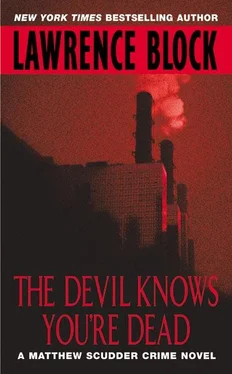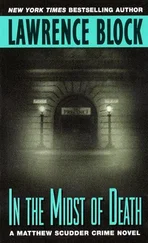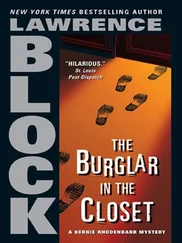Now and then, though, a case won’t solve itself and no one will be obliging enough to drop a dime on the bad guy. (Or on the good guy; snitches lie, too, like everybody else.) Sometimes it takes actual police work to clear a file, and that’s when GOYAKOD comes into play.
It’s what I was doing now. I was employing a foul-weather version of GOYAKOD. I was sitting on my ass and using the phone, waging the same kind of war of attrition on the blank wall of Glenn Holtzmann’s death. The only thing wrong with it is that sometimes it becomes pointless and mechanical. You’re at a dead end, but rather than admit it and try to figure out where you took a wrong turn, you keep on knocking on doors, grateful that there is an endless supply of doors to knock on, grateful that you can keep busy and tell yourself you’re doing something useful.
So I didn’t call the Grandview. But I didn’t throw their number away, either. I kept it handy, in case I ran out of doors.
When I reached Michael Jespesson, he was shocked to learn that Glenn Holtzmann was dead. He had been aware of the murder but had paid very little attention to it; it was, after all, a street crime committed on streets well removed from his own. And it had been several years since Holtzmann had been associated with his late firm. Somehow the victim’s name hadn’t registered.
“Of course I remember him,” he said. “We were a small firm. Just a handful of associates plus a couple of paralegals. Holtzmann was a pleasant fellow. He was a few years older than the standard law-school graduate, but only a few years. The first impression he made was that of a real self-starter, but he turned out to be less ambitious than I’d guessed. He did his work, but he wasn’t going to set the world on fire.”
That echoed what Eleanor Yount had told me. She’d initially seen him as a likely successor, then realized he lacked the drive. But somehow he’d driven himself all the way to the twenty-eighth floor. Add up the cash and the apartment and he’d left an estate well in excess of half a million dollars. Imagine what he could have accomplished if he’d had a little ambition.
“Maybe he was just in the wrong place,” Jespesson said. “I wasn’t surprised when he left. I never thought he’d stay. He was single, he hadn’t grown up in the area, so what was he doing in White Plains? Not that he was a born New Yorker. He was from somewhere in the Midwest, wasn’t he?”
“Pennsylvania.”
“Well, that’s not the Midwest. But he wasn’t from Philadelphia. He was from somewhere out in the sticks, if I remember correctly.”
“I think Altoona.”
“Altoona. New York is full of people from Altoona. White Plains isn’t. So I wasn’t surprised when he left us, and if he hadn’t left then he’d have done so a few months later.”
“Why?”
“The firm broke up. Sorry, I took it for granted that you knew that, but there’s no reason why you should. Nothing to do with Holtzmann, anyway, and I don’t think he could have read the handwriting on the wall. I don’t think there was any handwriting on the wall. I certainly didn’t see it.”
I asked if there was anyone else I should talk to.
“I think I knew him as well as anyone,” he said. “But how do you come to be investigating? I thought you had a man in custody.”
“Routine follow-up,” I said.
“But you do have the man responsible? A homeless derelict, if I remember correctly.” He snorted. “I was going to say he should have stayed in White Plains, but we have our share of street crime here, I’m sorry to say. My wife and I live in a gated community. If you wanted to visit us I would have to leave your name with the guard. Can you imagine? A gated community. Like a stockade, or a medieval walled city.”
“I understand they have them all over the country.”
“Gated communities? Oh yes, they’re quite the rage. But not in Altoona, I shouldn’t think.” Another snort. “Maybe he should have stayed in Altoona.”
Why didn’t he?
Why had he come to New York? He’d gone to college not far from home, returned home after graduation, and very likely fallen into the job selling insurance at his uncle’s agency. Then when he came into a few dollars he moved to New York and went to law school.
Why? Didn’t Penn State have a law school? It would have been cheaper than moving to New York, and would have been a logical preface to taking the Pennsylvania bar exam and practicing law not far from home. He could even have gone on selling insurance in his free time; he wouldn’t have been the first person to work his way through law school in that fashion.
But instead he’d had a clean break. Hadn’t looked back, as far as I could tell. Hadn’t taken his bride back home, hadn’t introduced her to his family.
What had he left behind? And what had he taken with him when he made the move? How much had his parents left him?
Or had they left him anything at all?
Start with the uncle. I called Eleanor Yount to see if the firm’s records had him listed by name. She had an assistant pull Glenn’s résumé and reported that he had not been specific in listing his job experience prior to law school. Like his after-school jobs and summer employment, his career in insurance had been merely summarized. Sales and administrative work at uncle’s insurance office, Altoona, PA , he’d written, along with the dates.
I got through to the Information operator in Altoona and had her check the Yellow Pages listings for an insurance agent named Holtzmann. There were a lot of Holtzmanns in the region, she told me, most but not all of them spelling it with two N ’s, but none of them seemed to be in the insurance business.
Of course your uncle doesn’t necessarily have the same last name as you. And there was a fair chance the uncle had died, or retired to Florida, or sold the business and bought a Burger King franchise.
Still, how big was Altoona? And how many insurance agents could it have, and wouldn’t they tend to know each other?
I asked the operator for the names and numbers of the two insurance agencies with the largest Yellow Pages ads. She seemed to think that was an amusing request, but she gave me what I wanted. I called them both, in each case managing to get through to someone who’d been there a while. I explained that I was trying to contact a man who had been in the insurance business in Altoona and who may have been named Holtzmann, but who in any event had employed his nephew, whose name was in fact Holtzmann, Glenn Holtzmann.
No luck.
I called Information again and got the names of half a dozen of the two-N Holtzmanns. I took them in order. The first two didn’t answer. The third was a woman with a voice like Ethel Merman’s who assured me that she knew all the Holtzmanns in town, that they were all related, and that there was no one in the family named Glenn. Nothing wrong with the name, but no Holtzmann had ever used it, and she would know if they had.
I said I thought he was from Roaring Spring.
Now that was a different story, she said. She didn’t quite say it, but she gave me the impression that people in Roaring Spring had tails. She knew there was a Holtzmann family in Roaring Spring, although she hadn’t heard tell of them in years and couldn’t say if any of them were still around. One thing she did know was that the Holtzmanns in Roaring Spring were not in any way related to the Holtzmanns in Altoona.
“Unless you go clear back to the Rhineland,” she said.
I called Information and asked for Holtzmanns in Roaring Spring, wondering why it hadn’t occurred to me to do so earlier. No matter. There weren’t any.
I called Lisa. Did she happen to know the name of the uncle at whose insurance agency Glenn had worked in Altoona?
Читать дальше












